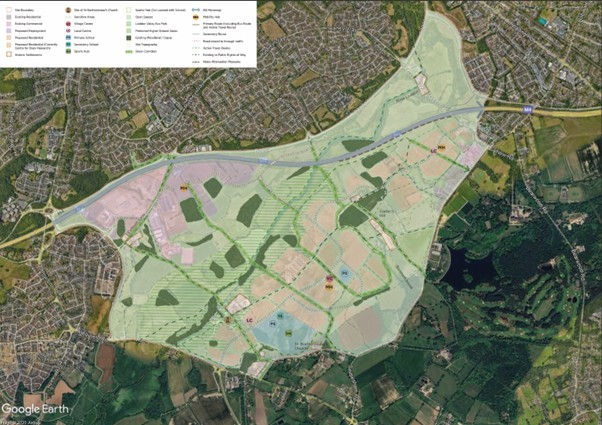A glimmer of hope?
- paulstevens24

- Apr 27, 2022
- 4 min read
Finally! WBC and SOLVE Hall Farm agree! The climate emergency requires urgent and serious action. We even (almost) agree on how to deal with it. WBC have sent out an electronic newsletter to Wokingham residents outlining how they can help fight the climate emergency from their gardens. SOLVE Hall Farm have written a report for the University of Reading outlining some alternative ideas to building 4,500 houses between Shinfield, Arborfield, Sindlesham and Winnersh. (Links to each are given below, along with a summary of their contents).
· What to plant, and where
· Caring for your plants
· Creating a haven for visitors
· Composting at home
· Recycling garden waste
· Food production
· Community involvement
· Products and services
· Heritage and history
· Holistic health
· Multi faith ceremonies
· Energy
· Re-wilding and carbon capture
Let's play "spot the difference".
“Our gardens can play a big role in fighting climate change. As well as benefiting wildlife and giving you the chance to grow your own fruit and vegetables, soil, plants and trees all soak up excess carbon dioxide.”
“In line with best practice from other successful Community Farms around the country investing time, effort or money could be rewarded with a share of the produce. A farm shop could also be set up to sell produce direct from the fields to visitors.”
“In the face of the global climate crisis, we urgently need trees to capture CO2 emissions and help make our towns and landscapes more resilient to the impacts of a changing climate”.
“Also, the planting of trees for long term carbon capture and storage is not only highly desirable in terms of helping to achieve net zero by 2050, it has all the advantages of fitting well with all of the ideas outlined above”
“Home grown means no packaging and no carbon footprint in getting it from ground to plate”
“One of the key arguments for preserving Hall Farm as productive farm land is based on the need for a reduced “carbon footprint” on our food, both by reducing foreign imports and encouraging people to buy locally”.
I could go on, but there isn’t really any need as clearly when we are talking about Combatting Global Climate Change there is increasingly a broad consensus of opinion on what should or could be done.
The WBC newsletter is aimed at residents and encourages them to make more environmentally friendly gardens. The SOLVE Hall Farm report is aimed at the University of Reading and encourages them to make more environmentally friendly decisions regarding the future of Hall Farm. When it comes down to it possibly the only real difference is one of scale.
Add up all the gardens in Wokingham and in terms of sheer acreage the gardens are probably way bigger than Hall Farm! But what Hall Farm has that most gardens don’t have is the acres of ancient woodland containing hundreds of veteran trees, the acres of flood plain, the vibrant local history and the visual impact of sweeping landscape views. Which is not to belittle the potential impact more ecologically aware gardening can have on climate change and the environment. But to encourage greener gardens at the same time as promoting building on fields, cutting down trees, uprooting hedgerows and turning wildlife havens into a photogenic backdrop for estate agent windows, am I alone in thinking this does not add up to a greener Wokingham?
To me that makes no sense at all. Hall farm is an island of green in a sea of grey. Already surrounded on three sides by Earley, Shinfield, Winnersh and Sindlesham, it seems that the Revised Local Plan Update as currently proposed by WBC is trying to create a continuous swathe of urban development that reaches all the way from Reading to Wokingham. With no currently available transport links on site this proposal will encourage more car dependency, and with no infrastructure on site this will mean years of highly polluting construction work.
Far be it from me to complain but I am currently sleeping with ear plugs in due to the noise of overnight road works on Mole Road. This road is so busy they could not afford to close it for a few days, or to even temporarily introduce lane controls to enable desperately needed road resurfacing to take place. Yet this is the road they plan to fill with construction lorries? Followed by thousands of cars when the proposed 4,500 houses add some 9,000 cars to the highways? This is a winding 2 lane country road with no streetlights and no footpaths, regularly used by pedestrians, cyclists and horse riders!
Taken together Hall Farm, residential gardens and other green spaces offer a fantastic opportunity for a more "environmentally friendly" or "carbon neutral" Wokingham. They could possibly even all complement and support one other, the sum of the whole worth more than the sum of the parts.
Perhaps WBC may yet see the sense of building the houses they “need” elsewhere, at Ashridge, for example. (Link here). Sadly, this would still lead to some loss of valuable green fields, but the impact on communities, landscape, biodiversity and heritage would be far less than if they built at Hall Farm.
Of course a potential way to preserve ALL our green fields would be to seek out more brown field sites, but this seems to be something WBC is still unwilling, or unable to do.
However, the latest Newsletter is a big improvement on the cries of “fake news”, "we have no choice" and "you all asked for this" we were treated to in previous editions.
Maybe there is hope for a greener Wokingham yet?





Comments